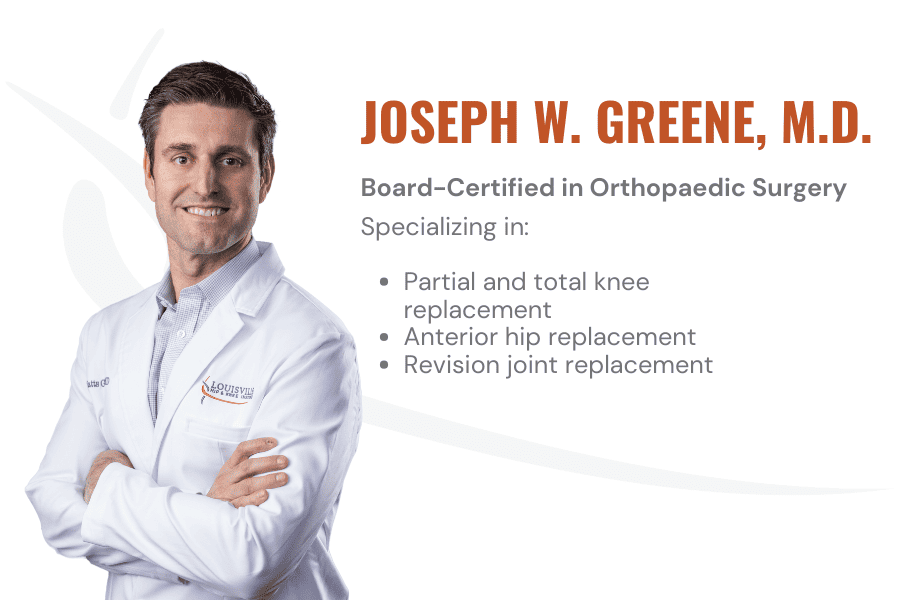Knee replacement surgery can be a life-changing procedure for those suffering from chronic knee pain and limited mobility. This journey is not just about the surgery itself; it’s equally about the path to recovery.
At the Louisville Hip & Knee Institute, you’ll find the expertise of Joseph W. Greene, M.D., a board-certified orthopedic surgeon specializing in hip and knee reconstruction. As you embark on your journey to recovery after knee replacement surgery, you may have questions like, “When can I resume my regular activities?” or “What sets total and partial knee replacement recoveries apart?”
Dr. Greene is here to offer answers and insights, ensuring knee replacement surgery patients clearly understand the path to recovery. If you have any questions about recovery after knee replacement, please contact us and make an appointment with Dr. Greene.
Knee Replacement Surgery: An Orthopedic Surgeon’s Perspective
 Knee replacement surgery, also known as knee arthroplasty, is a highly effective medical procedure designed to relieve severe knee pain and restore the normal function of the knee joint.
Knee replacement surgery, also known as knee arthroplasty, is a highly effective medical procedure designed to relieve severe knee pain and restore the normal function of the knee joint.
This surgery is recommended for patients who have debilitating knee conditions that have not responded to conservative treatments. Here’s a closer look at knee replacement surgery:
- Knee replacement surgery involves the removal of damaged cartilage and bone from the knee joint.
- It is typically performed under spinal or regional anesthesia, but general anesthesia is an option if spinal cannot be performed.
- During the procedure, damaged bone and cartilage are replaced with a prosthetic knee joint made of metal, plastic, or a combination.
- The surgery can be total, involving the replacement of the entire knee joint, or partial, which involves only the damaged parts.
- Post-surgery, patients usually experience reduced pain and improved mobility.
Who Should Consider Knee Replacement Surgery:
Knee replacement surgery is typically recommended for individuals who meet the following criteria:
- Severe pain that limits daily activities and interferes with sleep.
- Reduced knee function and mobility.
- Minimal relief from non-surgical treatments like physical therapy, medication, and assistive devices.
- Radiographic evidence of significant joint damage or degeneration.
It’s important to consult with a healthcare professional, such as an experienced knee surgeon, to determine if knee replacement surgery is the right course of action for your condition. Each case is unique, and the decision should be made individually, considering the patient’s overall health and lifestyle goals.
Is Knee Replacement Surgery Recovery Difficult?
The short answer is that it’s much more challenging to live with debilitating knee pain. Still, most patients return to regular activity without knee pain within 3 to 6 months of surgery.
According to Dr. Greene, “The knee is a more complex joint,” he adds. “It has three distinct planes of motion, which means there’s much more involved in regaining movement and strength after knee surgery than a hip replacement.”
What is the Recovery Timeline for Knee Replacement Surgery?
 Dr. Greene outlined a typical timeline for recovery from Knee replacement surgery:
Dr. Greene outlined a typical timeline for recovery from Knee replacement surgery:
- Immediate Post-Surgery: Knee replacement surgeries are typically outpatient, ensuring effective pain control for the first 24 to 36 hours.
- Days Two to Three: Be prepared for a peak in pain during these days. Don’t be discouraged; it’s a natural part of the process.
- Two Weeks Post-Surgery: By this point, most patients are getting up and able to use the restroom with relative ease. On average, many have transitioned from a walker to a cane, often within just one week.
- Around Six Weeks: Patients typically return to walking in their neighborhood and engaging in light exercise.
- Six Weeks and Beyond: Those with stand-up jobs that aren’t physically demanding can usually return to work around this time. However, if your job involves squatting, frequent automobile entry and exit, or working in a factory with strenuous tasks, it would be best to wait about three months before returning.
- Three Months Post-Surgery: At this point, patients are often back to hiking and enjoying outdoor activities, and some may even start to dabble in sports.
- Six Months and Beyond For individuals engaging in sports with increased twisting motions, such as tennis, racketball, or bowling, a full recovery may take around six months.
Total Knee Replacement vs. Partial Knee Replacement
The good news is that partial knee replacement recovery is typically quicker than total knee replacement. Dr. Greene touches on partial knee replacement, which boasts a faster recovery timeline. “I think most people are off the walker pretty quickly with a partial knee replacement,” he notes. “They’re back to walking in the neighborhood, hiking, and increased activities about three to four weeks after surgery.”
You should feel comfortable tackling more demanding activities like hiking for approximately six weeks. If you enjoy activities like tennis, racketball, or anything requiring significant physical effort, expect to return to them about three to four months after surgery.
Here’s an in-depth look at what to expect between these two surgeries:
Total knee replacement (TKR) and partial knee replacement (PKR) are different surgical approaches to address knee joint problems. Here are the key differences between them:
- Extent of Replacement:
-
-
- Total Knee Replacement (TKR): A TKR replaces the entire knee joint with a prosthetic implant. This involves resurfacing both the femoral and tibial joint surfaces and the patella (knee cap).
- Partial Knee Replacement (PKR): In a PKR, only a portion of the knee joint is replaced. This approach is used when one compartment of the knee is affected by osteoarthritis or damage, leaving the other parts relatively healthy.
-
- Indications:
-
-
- Total Knee Replacement (TKR): TKR is typically recommended for individuals with severe arthritis or extensive knee joint damage affecting multiple knee compartments.
- Partial Knee Replacement (PKR): PKR is appropriate when the arthritis or damage is limited to one knee compartment while the other compartments remain healthy.
-
- Preservation of Healthy Tissue:
-
-
- Total Knee Replacement (TKR): In TKR, all three knee compartments are resurfaced, which may require removing healthy bone and ligaments.
- Partial Knee Replacement (PKR): PKR preserves healthy bone, ligaments, and cartilage in the unaffected compartments, resulting in a more conservative surgical approach.
-
- Recovery and Rehabilitation:
-
-
- Total Knee Replacement (TKR): TKR typically involves a more extended recovery period and more intensive rehabilitation due to the more extensive surgery.
- Partial Knee Replacement (PKR): PKR often results in a shorter recovery period with less post-operative pain and quicker return to normal activities.
-
- Long-Term Outcomes:
-
-
- Total Knee Replacement (TKR): TKR provides reliable and effective pain relief and improved function for patients with widespread knee joint issues.
- Partial Knee Replacement (PKR): PKR can offer effective pain relief and function improvement for patients with localized knee joint problems but may not be suitable for those with more extensive knee joint issues.
-
- Revision Surgery:
-
- Total Knee Replacement (TKR): TKR revision surgery can be more complex if complications or wear and tear on the prosthetic components occur.
- Partial Knee Replacement (PKR): PKR revisions are often simpler, as they only involve the affected knee compartment. However, this requires conversion to a total knee replacement.
Your Next Steps to Improve Your Knee Pain
Knee replacement surgery is a journey, and the path to recovery varies depending on the type of surgery you undergo. Whether it’s a total or partial knee replacement, remember that patience and diligent physical therapy are your best friends on this road to regaining mobility and a pain-free life.
Ready to move without knee pain? If you or someone you know is considering knee replacement surgery, don’t hesitate to schedule an appointment with Dr. Joseph W. Greene.

